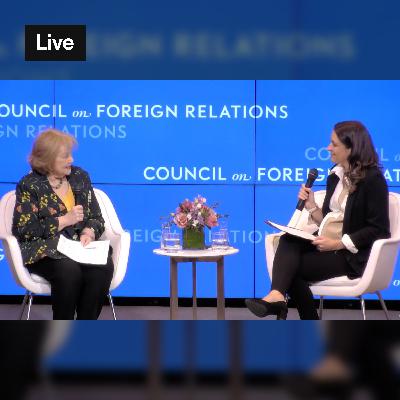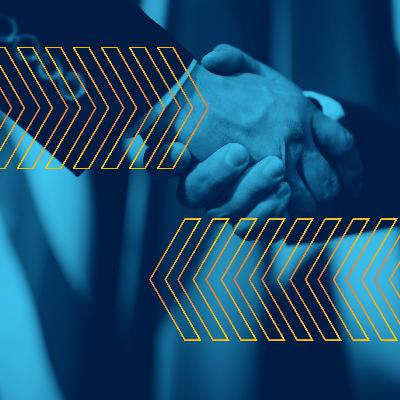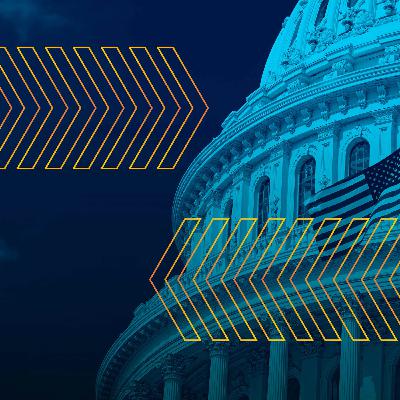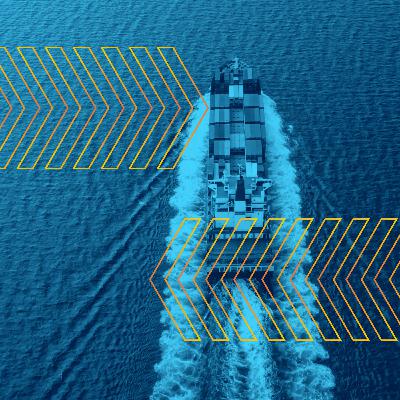Discover Why It Matters
Why It Matters

Why It Matters
Author: Council on Foreign Relations
Subscribed: 1,004Played: 20,967Subscribe
Share
© Copyright 2024 All rights reserved.
Description
Each episode of Why It Matters breaks down an issue that is shaping our world‘s future. Join host Gabrielle Sierra as she speaks with the leaders and thinkers who are facing these questions head on. Fueled by the minds at the Council on Foreign Relations, Why It Matters brings some of the world‘s most compelling stories home to you.
117 Episodes
Reverse
The unprecedented trade policies since the beginning of this year, driven largely by the Donald Trump administration’s pro-tariff agenda, have propelled the United States into uncertain and rocky territory. When it comes to our trading partners, the potential damage to U.S. alliances has left economists and policymakers in Washington questioning what’s next. Where do experts foresee U.S. trade policy heading?
This season, Why It Matters is taking you through the ins and outs of trade. In this season finale, CFR’s Michael Froman and Shannon K. O’Neil tackle your biggest questions about what’s at stake and what’s next for U.S. trade policy.
Featured Guests:
Michael Froman (President of the Council on Foreign Relations)
Shannon K. O’Neil (Senior Vice President, Director of Studies, and Maurice R. Greenberg Chair, CFR)
To hear more from Michael Froman, subscribe to his newsletter, The World This Week.
For an episode transcript and show notes, visit us at https://www.cfr.org/podcasts/wim/where-does-trade-go-here
Is having a trade deficit necessarily a bad thing? Many experts argue that the U.S. trade deficit is largely good for our economy. It allows Americans to enjoy a wider variety of cheap goods, attracts foreign investment, and reflects the strength of the U.S. dollar. Others believe it’s a warning sign that we’re relying too much on imports, hurting American jobs, and racking up debt owed to other countries.
This season, Why It Matters is taking you through the ins and outs of trade. In this episode, we unpack the trade deficit. What is it and why has it become a primary focus of the second Trump administration?
Featured Guests:
Brad W. Setser (The Whitney Shepardson Senior Fellow specializing in global trade and capital flows, financial vulnerability analysis, and sovereign debt restructuring, CFR)
Heather Hurlburt (Associate Fellow for the U.S. and the Americas Programme, Chatham House)
For an episode transcript and show notes, visit us at https://www.cfr.org/podcasts/wim/mind-trade-gap
Host Gabrielle Sierra and podcast guests Johanna Mendelson Forman and Matthew Costello discuss food diplomacy, share stories from White House state dinners, and unpack how food has helped to create lasting international partnerships.
This taping was originally recorded on April 17, 2025.
Featured Guests
Johanna Mendelson Forman (Distinguished Fellow at the Stimson Center, Adjunct Professor at American University’s School of International Service)
Matthew Costello (Chief Education Officer and Director of the David M. Rubenstein National Center for White House History at the White House Historical Association)
What role does the president have when it comes to making trade deals? In this episode, we dig into the expansive powers of the U.S. president when it comes to trade. From unilateral authority to congressional oversight, we unpack who truly calls the shots when the U.S. negotiates trade agreements.
This season, Why It Matters is taking you through the ins and outs of trade. In this episode, Why It Matters dissects the current state of U.S. trade agreements; what deals exist, which ones are under strain, and how President Donald Trump’s unconventional approach to trade negotiations is shifting the United States away from the norm.
Featured Guest:
Inu Manak (Fellow for trade policy at the Council on Foreign Relations)
For an episode transcript and show notes, visit us at https://www.cfr.org/podcasts/wim/trade-agreements-deal-or-no-deal
Tariffs have sparked intense debate in Washington, but their consequences land far from Capitol Hill. Tariffs can shape paychecks, shift prices for consumers, and affect markets. At best, tariffs offer short-term protection for certain industries. At worst, they can uproot the lives of American workers. In this episode, Why It Matters looks at what tariffs mean for a U.S. steel manufacturer and small business owner trying to stay afloat.
Featured Guests
Matthew P. Goodman, Distinguished Fellow and Director of the Greenberg Center for Geoeconomic Studies, CFR
Jamie Sychak, President of United Auto Workers Local 3303
Debbie Hendrickx, Founder and CEO of Swell Gelato
For an episode transcript and show notes, visit us at: https://www.cfr.org/podcasts/wim/tariff-turmoil-part-2-steel-and-dog-gelato
Tariffs are often discussed in big, abstract terms—trade wars, economic strategy, global power struggles. But for ginseng farmers in Wisconsin, their effects are painfully personal. In this episode, Why It Matters dives into how tariffs work and how they’re hitting one of America's most niche yet lucrative exports: Wisconsin-grown ginseng.
Featured Guests
Matthew P. Goodman, Distinguished Fellow and Director of the Greenberg Center for Geoeconomic Studies, CFR
Will Hsu, President of Hsu's Ginseng Enterprises Inc.
For an episode transcript and show notes, visit us at https://www.cfr.org/podcasts/wim/tariff-turmoil-part-1-how-tariffs-are-affecting-farmers
When it comes to trade, there is no consensus in Washington. The issue has become deeply polarizing, with lawmakers split over whether free trade agreements benefit or harm the U.S. economy. While some argue that open markets are essential for global leadership and economic growth, others believe that such policies disproportionately harm American workers and industries, fueling the rise of protectionist sentiment.
This season, Why It Matters is taking you through the ins and outs of trade. In this episode, we’re examining how trade policy is sizing up to be anything but consensus.
Featured Guests
Shannon K. O’Neil, Senior Vice President, Director of Studies, and Maurice R. Greenberg Chair, CFR
Edward Alden, Senior Fellow specializing in U.S. economic competitiveness, trade, and immigration policy
For an episode transcript and show notes, visit us at https://www.cfr.org/podcasts/wim/washington-consensus-could-not-hold
There was once a broad consensus in Washington that trade was a force for good—a way to connect, grow, and prosper. But today, trade has evolved into something much bigger than just the exchange of goods. It’s become a powerful tool to rewrite the rules of foreign policy, reshape how the United States is viewed by the rest of the world, and steer us toward an increasingly uncertain future. When did this change begin, and where did we go off course?
This season, Why It Matters is taking you through the ins and outs of trade. In this episode, we’re diving into the history books to learn what can the past tell us about the future of U.S. trade policy.
Featured Guest
Edward Alden, senior fellow specializing in U.S. economic competitiveness, trade, and immigration policy
For an episode transcript and show notes, visit us at https://www.cfr.org/podcasts/weve-been-looking-trade-all-wrong
Why It Matters is back and this time we are dedicating an entire season to talking about trade. Alongside CFR’s leading experts, we are bringing you stories from Americans around the country and trying to figure out where Washington went wrong when it comes to U.S. trade policy.
What powers artificial intelligence (AI)? As global electricity use is surging, with unprecedented demand coming from an increase in data centers, AI’s dependence on fossil fuels presents a serious issue for the planet. In the United States, data center power usage is on track to double by 2030, largely due to the proliferation of AI technology. But while the application of AI shows potential to mitigate climate problems, will its power grab stall the clean energy transition?
Featured Guests:
Varun Sivaram, Senior Fellow for Climate and Energy, CFR
For an episode transcript and show notes, visit us at https://www.cfr.org/podcasts/wim/dirty-energy-powering-ai
Tumultuous events have rocked the last four years: the COVID-19 pandemic, Europe’s largest land war in eighty years, and an escalating Middle Eastern conflict between Israel and Iran-backed forces. On top of that, the United States faces an intensifying geopolitical struggle with China and Russia. Now, U.S. President Joe Biden is running out of time to secure his legacy while the transition to a second Donald Trump administration comes sharply into focus. The U.S. president-elect has been quickly nominating leaders to his cabinet and receiving calls from foreign leaders.
Why It Matters sits down with the hosts of The World Next Week to talk about what the United States–and a closely watching world–should expect in the weeks and months to come as incoming President Trump takes office.
Featured Guests:
Robert McMahon (Managing Editor, CFR)
Carla Anne Robbins (Senior Fellow, CFR)
For an episode transcript and show notes, visit us at https://www.cfr.org/podcasts/why-world-next-week-matters
For most of our history, the realm of international relations was dominated by nation-states. They waged wars and signed treaties through the framework of governance. But today, more so than ever before, tech titans are acting as unilateral decision-makers, upsetting the balance and structure of global power around the world.
Featured Guests:
Rana Foroohar (Global Business Columnist and Associate Editor, Financial Times; Global Economic Analyst, CNN)
Adam Segal (Ira A. Lipman Chair in Emerging Technologies and Director of the Digital and Cyberspace Policy Program, CFR)
For an episode transcript and show notes, visit us at https://www.cfr.org/podcasts/wim/new-tech-world-order
With the rise of social media, influencers around the world have increasingly taken on the role of newscaster without a traditional media organization behind them. Some say it has democratized journalism, but with the rise of misinformation, influencers who capture massive audiences online also run the risk of spreading false or even harmful information. How much have influencers altered the media landscape?
Featured Guests:
Nic Newman (Senior Research Associate, Reuters Institute)
Michael Spikes (Lecturer and Director of Teach for Chicago Journalism Program, Northwestern University)
Renee DiResta (Technical Research Manager, Stanford Internet Observatory)
For an episode transcript and show notes, visit us at https://www.cfr.org/podcasts/wim/world-under-influence
The United States national debt is rising to levels not seen since World War II. Many economists say Washington is on an unsustainable track, but no one knows when it will pass the point of crisis. What is at risk if U.S. debt continues to grow?
Featured Guests:
Maya MacGuineas (President of the Committee for a Responsible Federal Budget)
Roger W. Ferguson Jr. (Steven A. Tananbaum Distinguished Fellow for International Economics, CFR)
For an episode transcript and show notes, visit us at: https://www.cfr.org/podcasts/wim/whos-afraid-national-debt
The world is watching the U.S. presidential contest between former President Donald Trump and Vice President Kamala Harris with intense interest. Few countries are tracking the race more closely than Germany, Europe's biggest economy and a founding member of the NATO alliance. Its experiences provide insights into how this election is reverberating globally.
Featured Guests:
Liana Fix (Fellow for Europe, CFR)
Stefan Kornelius (Foreign Editor, Süddeutsche Zeitung)
For an episode transcript and show notes, visit us at: https://www.cfr.org/podcasts/wim/why-world-obsessed-us-election-ask-germany
West Africa is losing many of its best and brightest. Across the region, doctors, lawyers, and engineers are leaving, depriving some of the world’s youngest countries of the minds they need to develop sustainably. At the same time, coups have rocked the nearby Sahel, threatening to create a corrosive cycle of instability. Can West Africa quell the tide of emigration?
Featured Guests:
Aanu Adeoye (West Africa correspondent, Financial Times)
Ebenezer Obadare (Douglas Dillon Senior Fellow for Africa Studies, CFR)
For an episode transcript and show notes, visit us at: https://www.cfr.org/podcasts/can-west-africa-curb-its-brain-drain
In the past thirty years, sixty countries have expanded access to abortion care as an underpinning of maternal health. The 2022 U.S. Supreme Court decision overturning Roe v. Wade made the United States the fourth country ever to decrease access to abortion—and the world took notice. Some countries have since reinforced protections for abortion care, while others have moved to further restrict it.
Featured Guests:
Onikepe Owolabi (Director of International Research, Guttmacher Institute)
Patty Skuster (Reproductive Health Law Policy Researcher and Consultant, University of Pennsylvania)
For an episode transcript and show notes, visit us at https://www.cfr.org/podcasts/global-abortion-access-after-roe
Prime Minister Narendra Modi is the most popular man in India. On track to be elected for a third term, he has boosted the country’s global standing and propelled strong economic growth while consolidating power and galvanizing majoritarian support for his Hindu nationalist agenda—all while growing closer to the United States. How could Hindu nationalism reshape India?
Ashok Swain (Head of Department of Peace and Conflict Research, Uppsala University)
Hartosh Singh Bal (Executive Editor, The Caravan)
For an episode transcript and show notes, visit us at: https://www.cfr.org/podcasts/india-modi-and-hindu-nationalism
A free and independent press is at the core of many democracies. But threats to the safety of journalists abound worldwide, and the rise of generative artificial intelligence has raised concerns about the future of media. At the same time, more people have access to high quality news now than perhaps ever before. Where does all this leave the state of the current media climate?
In this episode, Host Gabrielle Sierra and Foreign Affairs Editor Daniel Kurtz-Phelan talk about the future of journalism, and whether political polarization presents a challenge to nonpartisan publishing.
Dan Kurtz-Phelan (Executive Editor, Foreign Affairs)
For an episode transcript and show notes, visit us at: https://www.cfr.org/podcasts/publishing-polarized-world
A little over a week ago, Iran directly attacked Israel from its own territory for the first time in history. And while the United States and Israel shot down almost all of the missiles and drones, the attack remains unprecedented. Since the release of this episode, Israel has launched a relatively moderate counter strike, and tensions appear to be cooling. But the Middle East might still be on the brink of a wider war. Host Dan Kurtz-Phelan and guests Suzanne Maloney and Ali Vaez discuss the consequences of deteriorating Iran-Israel dynamics and more in this Foreign Affairs Interview episode.
For an episode transcript and show notes, visit Foreign Affairs at https://www.foreignaffairs.com/podcasts/can-israel-and-iran-step-back-brink






















这真是一个有趣的题目。